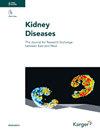The treatment of coronary artery disease in patients with chronic kidney disease: gaps, challenges and solutions.
IF 3.1
4区 医学
Q1 UROLOGY & NEPHROLOGY
引用次数: 0
Abstract
Background: Chronic kidney disease (CKD) is associated with a high burden of coronary artery disease (CAD), which remains the leading cause of death in CKD patients. Despite the high cardiovascular risk, ACS patients with renal dysfunction are less commonly treated with guideline-based medical therapy and are less frequently referred for coronary revascularization. Summary: The management of CAD is more challenging in patients with CKD than in the general population due to concerns regarding side effects and renal toxicity, as well as uncertainty regarding clinical benefit of guideline-based medical therapy and interventions. Patients with advanced CKD and especially those receiving dialysis have not traditionally been represented in randomized trials evaluating either medical or revascularization therapies. Thus, only scant data from small prospective studies or retrospective analyses are available. Recently published studies suggest that there are significant opportunities to substantially improve both cardiovascular and renal outcomes of patients with CAD and CKD, including new medications and interventions. Thus, the objective of this review is to summarize the current evidence regarding the management of CAD in CKD patients, in particular with respect to improvement of both cardiovascular and renal outcomes. Key Messages: Adequate medical therapy and coronary interventions using evidence-based strategies can improve both cardiac and renal outcomes in patients with CAD and CKD.慢性肾病患者冠状动脉疾病的治疗:差距、挑战和解决方案。
& lt; b> & lt; i>背景:& lt; / i> & lt; / b>慢性肾脏疾病(CKD)与冠状动脉疾病(CAD)的高负担相关,这仍然是CKD患者死亡的主要原因。尽管有较高的心血管风险,但ACS合并肾功能不全的患者很少接受基于指南的药物治疗,也很少接受冠状动脉血管重建术。& lt; b> & lt; i>简介:& lt; / i> & lt; / b>由于对副作用和肾毒性的担忧,以及基于指南的药物治疗和干预的临床获益的不确定性,CKD患者的CAD管理比一般人群更具挑战性。晚期CKD患者,尤其是接受透析治疗的患者,传统上并没有出现在评估药物治疗或血运重建治疗的随机试验中。因此,只有来自小型前瞻性研究或回顾性分析的少量数据可用。最近发表的研究表明,冠心病和慢性肾病患者的心血管和肾脏预后有很大的改善机会,包括新的药物和干预措施。因此,本综述的目的是总结目前关于CKD患者冠心病管理的证据,特别是关于心血管和肾脏预后的改善。& lt; b> & lt; i>关键信息:& lt; / i> & lt; / b>适当的药物治疗和采用循证策略的冠状动脉干预可以改善CAD和CKD患者的心脏和肾脏预后。
本文章由计算机程序翻译,如有差异,请以英文原文为准。
求助全文
约1分钟内获得全文
求助全文
来源期刊

Kidney Diseases
UROLOGY & NEPHROLOGY-
CiteScore
6.00
自引率
2.70%
发文量
33
审稿时长
27 weeks
期刊介绍:
''Kidney Diseases'' aims to provide a platform for Asian and Western research to further and support communication and exchange of knowledge. Review articles cover the most recent clinical and basic science relevant to the entire field of nephrological disorders, including glomerular diseases, acute and chronic kidney injury, tubulo-interstitial disease, hypertension and metabolism-related disorders, end-stage renal disease, and genetic kidney disease. Special articles are prepared by two authors, one from East and one from West, which compare genetics, epidemiology, diagnosis methods, and treatment options of a disease.
 求助内容:
求助内容: 应助结果提醒方式:
应助结果提醒方式:


